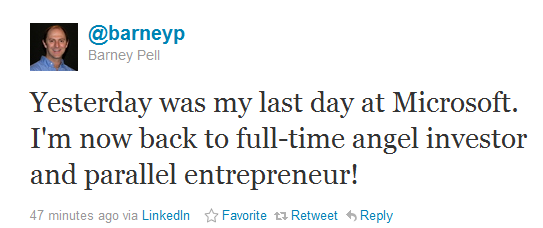The Microsoft revolving door: Former Powerset CEO has left the building

Another big-name defection from Microsoft this week: Barney Pell.
Pell may not be a household name, but he is to those following the twists and turns of Microsoft's search business. As Pell's LinkedIn profile notes, he joined Microsoft when the Softies bought his startup, Powerset. His last official title at Microsoft seems to be "Chief Architect for Local Search."
Pell tweeted on September 6 that yesterday was his last day and that he's now "back to full-time angel investor and parallel entrepreneur!"
"While at Microsoft, I was a Partner-level executive strategist, evangelist, architect, and development manager for Bing. Key contributions included: Influenced strategy across a spectrum of Bing feature areas, evangelized Bing to US and international audiences, led the development of Microsoft's Online Systems Division's long range plan for natural language, semantics and knowledge technology, led development for Bing Local/Mobile Search, and created a search quality initiative that became an institution," Pell's LinkedIn bio reads.
According to LinkedIn, Pell left Microsoft in September 2011, three years and a month after joining the company.
Powerset was a natural-language search vendor that Microsoft acquired (after much rumor and speculation) in July 2008 for an undisclosed amount. (The rumored value of the transaction was as high as $100 million. Some even called Microsoft's purchase of Powerset its "Plan B" after its original proposal to buy Yahoo was scuttled.)
Powerset "used a sophisticated natural language parser (licensed from Xerox PARC) to find subjects, verbs, objects, synonyms, and other elements for indexing," explained a blog post on News.com from 2008. "Powerset differs from the Google in that it extracts and indexes concepts, relationships, and meaning, rather than keywords. It's able to create connections and pivot in some cases in ways that elude Google's proficient engine, which favors more of a statistical approach," the post added.
Microsoft officials, including CEO Steve Ballmer, have been trumpeting Bing's ability to support complex natural-language commands using speech. Realization of this goal may still be another three to five years out, however.
Again, as I've wondered aloud in several recent posts on various Microsoft defections, what gives? Why are folks jumping ship now (besides the oft-cited stock-vesting reasons)? One of my readers with good knowledge of Microsoft's inner-workings had an interesting theory.
"The opportunities for (Microsoft internal) Partners and CVPs (Corporate Vice Presidents) is shrinking, in large part because some of (Windows Chief) Steven Sinofsky's philosophies are being adopted across the company. One, for example, is the continuing elimination of the GM (General Manager) and PUM (Product Unit Manager) roles in favor of the discipline directors reporting to the CVP, SVP, or even President level," my contact said.
This means that specialists are becoming favored over generalists, and "anyone wanting to 'own' something inside Microsoft is out of luck," my contact said..
Like I said: It's one theory. Make of it what you will....
(Thanks to @pradeepviswav for the heads-up on Pell's departure.)
